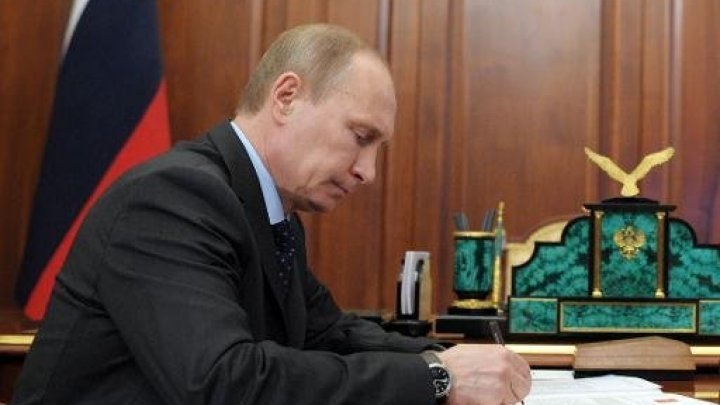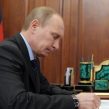
Putin Picks the Worst of All Bad Choices
Publication: Eurasia Daily Monitor Volume: 11 Issue: 147
By:

With the arrival of August, political expectations in Russia, informed by the long experience of setbacks and disasters, are turning negative. Second thoughts about the “victorious” war with Georgia that erupted six years ago blend with reflections on the centennial anniversary of World War I (Nezavisimaya Gazeta, August 6). At the same time, liberal-minded pundits remind the public about Russia’s 1998 fiscal default, while arguing that in a globalized world the most devastating battles are fought in the financial realm (Novaya Gazeta, August 6). Whereas, the smoke coming from the sunflower fields in eastern Ukraine, where the Moscow-backed separatist war smolders on, turns many minds from virtual to real-life battles as premonitions of a Russian intervention keep recurring. Against these forebodings, President Vladimir Putin gave marching orders last week not to Russian troops but to customs officials, imposing a comprehensive ban on imports of agricultural products from the United States, the European Union, Australia, Canada and Norway (see EDM, August 7; Polit.ru, August 7; Kommersant, August 8).
That counter-strike against Western pressure appeared far off-target, and the Russian blogosphere exploded with jokes about Putin following the US leadership in imposing sanctions against Russia (BestToday, August 9). Yet, there were also serious reasons to expect a forceful move from Moscow in the theater of combat operations, where the rebels are in retreat across many localities, concentrating their war-bands on defending the strongholds in Donetsk and Luhansk (Polit.ru, August 6). Russia initiated two meetings of the United Nations Security Council last week, presenting the case for alleviating the “humanitarian catastrophe” in eastern Ukraine by delivering emergency aid, which would be protected by Russian “peacekeeping forces”; Moscow even began preparing a powerful convoy for the task (Newsru.com, August 9). Many member states of the North Atlantic Treaty Organization (NATO) saw in that “humanitarianism” an attempt to camouflage a military intervention, and the US issued a strong warning about the consequences of such an unacceptable escalation of hostilities (RIA Novosti, August 9).
These warnings and the visit to Kyiv (August 7) of NATO Secretary General Anders Fogh Rasmussen made the intended impression. Therefore, the recent meeting of the Russian Security Council resulted only in further lamentations about the plight of civilians in the encircled Donetsk (Gazeta.ru, August 7; Newsru.com, August 9). The fall of Donetsk, where the rebel forces can no longer receive reinforcements from Russia, would indeed signify the end of Moscow’s efforts at “freezing” the conflict and securing some sort of quasi-independent “Novorossiya” (see EDM, August 8; Moskovsky Komsmolets, August 9). The status–quo could be rescued only by swiftly reestablishing a supply corridor by moving in Russian battalions. But the risk assessments of such “muscular peacekeeping” are sobering even for the most committed “patriots” in the Kremlin corridors (Ezhednevny Zhurnal, August 8).
In this gloomy situation, it was deemed necessary to replace the story of a “heroic” defeat with a positive perspective, and it is hardly possible to find a better way to assert Russia’s defiance in the face of NATO hostility than to reject Western food. This master-strike is aimed at the deep-rooted complex of food in the Russian psyche (Slon.ru, August 8). The laboriously stirred anti-Western feelings are mixing with irritation against cosmopolitan elites and fears about Soviet-style food shortages—and this concoction produces a toxic xenophobic angst. The economic effects of the ban were clearly given only superficial consideration and could turn out to be devastating.
Firstly, it is impossible to find alternative suppliers who could deliver dairy products, meat and fruit worth $12 billion that Russia imports from the EU (additionally, Norway provides up to 40% of Russia’s salmon imports). Moreover, Russia’s domestic food industry depends on various fine ingredients supplied by France, Finland or the Netherlands, so Putin’s assurances about the benefits for domestic producers is just propaganda (RBC Daily, August 8). Russia will hardly be able to justify its “forced response” to Western sanctions in the World Trade Organization (WTO) (Slon.ru, August 8). And it is by no means only the urban middle classes in Moscow that will suffer from the absence of Italian mozzarella or French foie gras on their plates; prices on the most basic kinds of food are certain to go up, and the annual inflation will most probably spike above 10 percent (Gazeta.ru, August 8). The federal budget will have to go deep into the red to cover the costs of extra-urgent import substitutions. Earlier last week, Sergei Belyakov, the deputy minister for economic development, apologized on his Facebook page for the government’s “stupid” decision to appropriate Russian pension savings—he was instantly fired (Vedomosti, August 7).
By launching the “hunger games,” Putin probably aimed also to alarm European farmers and add their lobbies to the motley coalition of his foreign allies, in which extreme-right groups go hand in hand with unscrupulous politicians of various persuasions (Novaya Gazeta, August 9). He apparently does not understand the profound shift in European public opinion, which is particularly focused on his personality. Therefore, he arguably cannot comprehend how Ukraine connects with this outrage and disgust, not least after introducing its own sanctions against Russia, costly as they are certain to be (Kommersant, August 9). He still seemingly fancies himself a “transformer” of the global system who commands respect among his peers and speaks for all opponents of US “hegemony,” failing to understand that the turn to “romantic” nationalism and aggressive bullying of weaker neighbors places him in the category of international pariah (Gazeta.ru, August 7).
What makes this transition from statesman to dangerous despot even more complete is the inability to see that forceful measures involving cheese and ham leave him looking ridiculous. He has argued for months that the West’s sanctions policy was “counterproductive.” But now he is himself punishing Muscovites by forcing Italian restaurants and sushi bars to go out of business. Indeed, his expectation that Parmesan-makers and salmon-producers will riot out of solidarity with Russia is typical of an authoritarian leader out of touch with reality. The best hope for Putin’s subjects—who are eager to pledge loyalty but tend to interpret laws and orders as undue interference on their ability to muddle through—is the greed of the Kremlin courtiers who assess risks based on cash flows rather than nuclear warhead yields. Russia’s corruption guarantees that, by rushing from bluff to blunder, Moscow will not win in its confrontation with the West. Putin’s regime will collapse under a pathetic runaway squabble before reaching any last stand.




